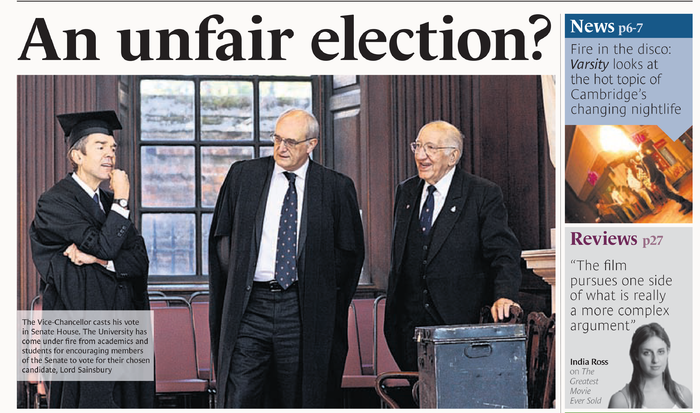Universally Challenged: Cambridge students’ worst feedback
Some of the criticism dished out by Cambridge dons can be more destructive than constructive

“Within all beings there is the seed of perfection. However, compassion is required in order to activate that seed which is inherent in our hearts and minds....” the 14th Dalai Lama said, and the Cambridge supervisors listened. At the heart of this world-beating education is the principle of compassionate, constructive criticism. The supervision format is the prime, pedagogical opportunity to pull apart your work, find the flaws and stick it back together in a safe environment. Inevitably, as a humanities student, not all your essays are going to be the best one. In fact, it’s a comparative impossibility. Some will be close to perfect, others not so much. But feedback is given in the spirit of Dalai Lama-inspired compassion aimed to bring out the best in students… mostly.
“Feedback is given in the spirit of Dalai Lama-inspired compassion aimed to bring out the best in students”
Every now and again, students produce work which is seriously and concerningly sub-par. And every now and again, professors run out of their compassion and feel the overwhelming urge to be uncontrollably and brutally honest. Thanks to some very kind contributions of Cambridge students here at Varsity, we have gathered some of the finest, most eloquently brutal comments left on student essays.
We start off with a rather panicked English professor who found themselves unwooed by the incompetence of a first year supervision essay on mediaeval romance. They simply wrote:“ARGH DELETE DELETE”
Next up, we turn to a politics professor who was distinctly unimpressed with the writing style of one first year’s thoughts on Weber. So unimpressed in fact, he was not sure university was for the aforementioned (now diagnosed dyslexic) fresher: “You need help with your English writing. It is not adequate for university-level writing.”
Staying on the theme of style, a geographer submitted a piece of feedback given on their first year exam. Luckily, the first year doesn’t count for ambling Geographers.“A somewhat naive, pedestrian, hesitant writing style”
Unfortunately second year does count for Geographers, which was a horrible realisation for the anonymous student who received this on their exam:“This is borderline unacceptable”
When you have ten essays in eight weeks, word count is the aim of the game. Churn up words until you hit that magical 2,000 number, press submit and never look back. Or maybe just try and sneak under the 2,000 word boundary as one HSPS fresher bravely attempted. Their supervisor reflected on this choice, writing:“’Some people write with sufficient concision that they can pack into their 1,500 words what others need 2,000+ to say. But they are unusual, and I am not sure that you are one of them.”
“Their essays are allowed to include pretty drawings”
Rumour has it that occasionally, just occasionally, STEM students are asked to write essays. But don’t fret, their essays are allowed to include pretty drawings. Unfortunately these drawings are meant to be contributory towards the essay topic at hand as one first year natsci discovered upon received the feedback:“Does this diagram help answer the question? Like at all?”
It is a truth universally acknowledged that an English degree is really really hard. Sometimes, as an Engling, it can be a struggle. This particular Engling, however, was pretty confident on this essay. Unfortunately, their supervisor was a bit more sceptical.“I can tell you struggled this week”
A second year lawyer also suffered from over-assertiveness, only this time allegedly making claims which were not substantiated by the actual law. Their supervisor responded:“This is not doing law. This is reading tea leaves”
The crème de la crème of compassionate supervision feedback however, goes to an Oxford history tutor who delivered the devastating, but admirably theatrical piece of feedback on a tute essay.
He crossed out every word of the essay other than the word ‘wrong’, circled it, and wrote: “this is the only thing that’s right in this whole essay”
 News / Uni Scout and Guide Club affirms trans inclusion 12 December 2025
News / Uni Scout and Guide Club affirms trans inclusion 12 December 2025 News / Cambridge Vet School gets lifeline year to stay accredited28 November 2025
News / Cambridge Vet School gets lifeline year to stay accredited28 November 2025 News / Cambridge study finds students learn better with notes than AI13 December 2025
News / Cambridge study finds students learn better with notes than AI13 December 2025 Science / Did your ex trip on King’s Parade? The science behind the ‘ick’12 December 2025
Science / Did your ex trip on King’s Parade? The science behind the ‘ick’12 December 2025 News / Pembroke to convert listed office building into accom9 December 2025
News / Pembroke to convert listed office building into accom9 December 2025








